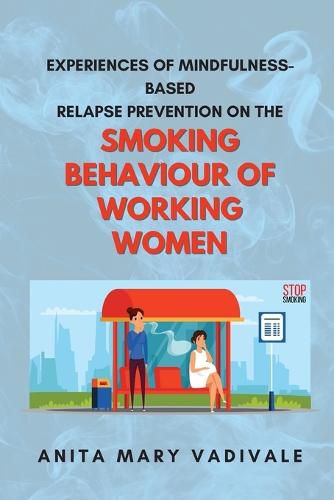Readings Newsletter
Become a Readings Member to make your shopping experience even easier.
Sign in or sign up for free!
You’re not far away from qualifying for FREE standard shipping within Australia
You’ve qualified for FREE standard shipping within Australia
The cart is loading…






This title is printed to order. This book may have been self-published. If so, we cannot guarantee the quality of the content. In the main most books will have gone through the editing process however some may not. We therefore suggest that you be aware of this before ordering this book. If in doubt check either the author or publisher’s details as we are unable to accept any returns unless they are faulty. Please contact us if you have any questions.
Smoking is the highest cause of preventable deaths in the world. The number of working women prone to addiction is high due to the levels of stress witnessed. The number of working women who have taken up smoking has increased and is said to increase by 20 percent by the year 2025 if not addressed. Mindfulness, a Buddhist meditative technique helps with managing addiction to nicotine. Mindfulness-based relapse prevention has shown promise to reduce relapse levels among people who smoke. The primary objective of the study is to check the experiences of mindfulness-based relapse prevention (MBRP) on the smoking behavior of working women in India. An embedded experimental design was carried out on eight working women who were selected using purposeful sampling. The participants went through eight two- hourly sessions of MBRP therapy, one session a week. Three sets of interviews (pre-intervention, mid-intervention, and post-intervention) were conducted including pre and post-test to check the levels of abstinence self-efficacy, mindfulness, perceived stress, and craving. Follow-up was carried out one week, one, two, and six months post-intervention. Thematic analysis was used for the interpretation of qualitative data and paired sample t-test was used for the analysis of quantitative data. The themes that emerged were experiences with the habit of smoking, which included the history of initiation, reasons for smoking, the transformation seen, and the history of quit attempts. Four weeks into the intervention the themes that emerged were impactful components within the self, supporting outcomes of practice, and challenging experiences. Post the intervention experiencing changes, experiencing challenges through the intervention and strategies for abstinence and continued practice emerged. Mindfulness and abstinence self-efficacy had risen whereas craving and stress had reduced. Follow-up at one week showed no changes in results. One and two months follow-up showed reduced practice hours of mindfulness with no full-blown relapse. Six-month follow-up showed a 37.5 percent relapse with a reduction in the number of cigarettes consumed. Though beneficial for smoking relapse prevention efficacy reduces post-intervention, where regular follow-up sessions, are required for the continued practice of mindfulness.
$9.00 standard shipping within Australia
FREE standard shipping within Australia for orders over $100.00
Express & International shipping calculated at checkout
This title is printed to order. This book may have been self-published. If so, we cannot guarantee the quality of the content. In the main most books will have gone through the editing process however some may not. We therefore suggest that you be aware of this before ordering this book. If in doubt check either the author or publisher’s details as we are unable to accept any returns unless they are faulty. Please contact us if you have any questions.
Smoking is the highest cause of preventable deaths in the world. The number of working women prone to addiction is high due to the levels of stress witnessed. The number of working women who have taken up smoking has increased and is said to increase by 20 percent by the year 2025 if not addressed. Mindfulness, a Buddhist meditative technique helps with managing addiction to nicotine. Mindfulness-based relapse prevention has shown promise to reduce relapse levels among people who smoke. The primary objective of the study is to check the experiences of mindfulness-based relapse prevention (MBRP) on the smoking behavior of working women in India. An embedded experimental design was carried out on eight working women who were selected using purposeful sampling. The participants went through eight two- hourly sessions of MBRP therapy, one session a week. Three sets of interviews (pre-intervention, mid-intervention, and post-intervention) were conducted including pre and post-test to check the levels of abstinence self-efficacy, mindfulness, perceived stress, and craving. Follow-up was carried out one week, one, two, and six months post-intervention. Thematic analysis was used for the interpretation of qualitative data and paired sample t-test was used for the analysis of quantitative data. The themes that emerged were experiences with the habit of smoking, which included the history of initiation, reasons for smoking, the transformation seen, and the history of quit attempts. Four weeks into the intervention the themes that emerged were impactful components within the self, supporting outcomes of practice, and challenging experiences. Post the intervention experiencing changes, experiencing challenges through the intervention and strategies for abstinence and continued practice emerged. Mindfulness and abstinence self-efficacy had risen whereas craving and stress had reduced. Follow-up at one week showed no changes in results. One and two months follow-up showed reduced practice hours of mindfulness with no full-blown relapse. Six-month follow-up showed a 37.5 percent relapse with a reduction in the number of cigarettes consumed. Though beneficial for smoking relapse prevention efficacy reduces post-intervention, where regular follow-up sessions, are required for the continued practice of mindfulness.